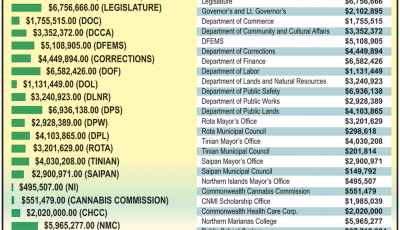Bid to have theft case dismissed is denied
Peter Koichi Lemei’s bid to have his theft case dismissed on grounds of alleged destruction of evidence was denied.
Superior Court Associate Judge Joseph N. Camacho ruled yesterday that Lemei failed to establish all three elements that must be shown for his motion to dismiss to succeed. Camacho cited the U.S. Supreme Court ruling in Youngblood v. Trombetta.
The factors are that the government acted in bad faith in failing to preserve the evidence, that the exculpatory value of evidence was apparent before its destruction, and that the nature of the evidence was such that the defendant would be unable to obtain comparable evidence by other means.
The Office of the Attorney General had charged Koichi with misdemeanor theft for stealing a purse from a woman, while she was sitting in a friend’s garage playing cards last April 10 at about 5:30am.
Assistant public defender Tillman Clark, counsel for Lemei, moved to dismiss the case. As an alternative, Clark asked the court to bar the government from calling the alleged victim as a witness in this case.
Clark also sought sanctions against police detective Andrew Taimanao, the Department of Public Safety, and the government “in the interests of public policy.
Clark said dismissal is an appropriate remedy given the importance of the evidence and the inability of Lemei to reproduce it.
Alternatively, Clark said, the court should order sanctions in the form of precluding the alleged victim from testifying.
Assistant attorney general Heather Barcinas opposed the motion.
It was already in the midst of a bench trial last August when Clark moved for a mistrial. Clark asserted that the government suppressed evidence when a witness testified that a police detective showed her with a photo lineup, but the detective denied it.
This prompted Camacho, who presided over the trial, to suspend the proceedings to hear the issue last Sept. 14. Last October, Camacho denied the motion for mistrial.
Camacho ruled that a continuance of the bench trial and re-call of witnesses will cure the law enforcement officer’s failure to provide exculpatory evidence.
Exculpatory evidence refers to evidence favorable to the defendant in a criminal case that tends to exonerate the defendant of guilt.
Taimanao testified that he did not remember showing the witness any photographs, and that he was surprised to learn that the witness testified that she had been shown photographs.
In Lemei’s motion to dismiss, Clark said by finding that Taimanao’s testimony was credible and a witness testimony was credible, the court made a finding of fact that Taimanao showed the witness a photo lineup with Koichi in it, that the witness failed to identify Koichi in that photo lineup, and that such evidence was subsequently suppressed by the government.
Clark said no material have been discovered to Koichi despite the ongoing discovery request.
As such, Clark said, the only logical conclusion is that the evidence (photo lineup) has been destroyed and lost forever.
In denying the motion, as to the bad faith factor Camacho said he already found in his previous order that Taimanao’s failure to note the witness’s non-identification was inadvertent.
Additionally, Camacho said, there is no evidence of official animus or a conscious effort to suppress evidence in the record before the court.
The judge said although he found Taimanao’s actions to be inadvertent, the non-identification of Lemei by an eyewitness is potentially exculpatory evidence, the nature of which would be apparent at the time of the non-identification.
As to the nature of evidence factor, Camacho said the defendant had access to both the phone line-up as well as the eyewitness’s testimony stating that she was unable to identify anyone in the photo line-up.
“These two facts taken together are comparable evidence,” Camacho pointed out.
Camacho said though the exculpatory evidence nature of the evidence was apparent at that time, Taimanao did not destroy the evidence in bad faith and Lemei has access to comparable evidence.


























